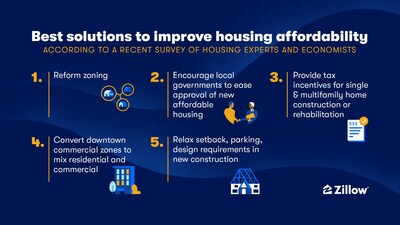- Economists and housing experts overwhelmingly agree that zoning reform is one of the best ways to make homes more affordable.
- Experts believe local jurisdictions need to streamline and ease the approval process for new affordable housing.
Relaxing zoning rules is one of the best ways to address the nation’s ongoing housing affordability crisis, according to an independent panel of economists and housing experts polled in Zillow’s Home Price Expectations (ZHPE) Survey1. Zoning reform, which would allow more housing within existing neighborhoods and growing communities, was ranked as one of the most effective means to address affordability by 73% of those surveyed.
“It seems straightforward: We need to build more homes,” said Dr. Skylar Olsen, Zillow’s chief economist. “Changes through policies like modest densification will give us more ‘at bats’ to create density and help communities stay livable for everyone. Without a huge injection of new homes in the near future, affordability will continue to be a challenge for many — especially for first-time home buyers.”
Housing affordability remains a defining feature of the U.S. housing market. The latest Zillow® data shows that while monthly mortgage costs are now just under $1,600 for a typically valued home after a 20% down payment, payments are still 46% higher than last January and $754 higher than before the pandemic (January 2020).
One key driver of the affordability crisis is the chronic shortage of new housing construction, which has not recovered from the Great Recession, resulting in a 3.79 million–unit gap in home production in 230 metro areas, according to a study released by Up for Growth, a nationwide think tank that focuses on addressing the country’s housing shortage through research and evidence-based policies.
“Restrictive and exclusionary zoning, artificial barriers, and NIMBY opposition have combined to create an unprecedented and persistent housing shortage,” said Mike Kingsella, CEO of Up for Growth. “Failure to address these issues will create lower economic output and fewer opportunities for everyone. Families and individuals will be forced to pay higher rents, the equity gap will widen, and transportation costs will rise as people are forced to travel greater distances for work and education.”
Panelists were asked to select several policies they believe would improve housing affordability and to rank the policies by effectiveness. While changes to zoning was the clear favorite for policy choice among panelists, the second-most-popular choice was to encourage governments to approve and build affordable housing more quickly, with 59% of economists believing it would be effective. Other policy changes, such as converting downtown commercial zones to encourage more residential use, providing tax credits to incentivize new home construction and relaxing design requirements such as parking mandates, received modest support from the expert panel when compared to zoning reform.
Last year, Zillow conducted a nationwide survey of homeowners and renters, and found overwhelming support for increasing housing density in existing neighborhoods. Allowing even minimal density through zoning reforms — for example, allowing a percentage of single-family lots to house two units — would yield millions of new homes.
“There are no quick fixes for the housing affordability problem in the U.S., especially at a time when demand for entry-level homes far exceeds available inventory,” said Terry Loebs, founder of Pulsenomics. “Supply-side initiatives such as those recommended by this panel may not be easy to implement, but they will be the most effective means to durably improve homeownership affordability and market balance.”
1 This edition of the ZHPE Survey polled 117 housing market experts and economists between December 5 and December 15, 2022. The survey was conducted by Pulsenomics LLC on behalf of Zillow, Inc. The Zillow Home Price Expectations Survey and any related materials are available through Zillow and Pulsenomics.
About Zillow Group:
Zillow Group, Inc. (NASDAQ: Z and ZG) is reimagining real estate to make it easier to unlock life’s next chapter. As the most visited real estate website in the United States, Zillow® and its affiliates offer customers an on-demand experience for selling, buying, renting, or financing with transparency and ease.
Zillow Group’s affiliates and subsidiaries include Zillow®; Zillow Premier Agent®; Zillow Home Loans™; Zillow Closing Services™; Trulia®; Out East®; StreetEasy®; HotPads®; and ShowingTime+™, which houses ShowingTime®, Bridge Interactive®, and dotloop® and interactive floor plans. Zillow Home Loans, LLC is an Equal Housing Lender, NMLS #10287 (www.nmlsconsumeraccess.org).
About Pulsenomics
Pulsenomics LLC (www.pulsenomics.com) is an independent research firm that specializes in data analytics, opinion research, new product and index development for institutional clients in the financial and real estate arenas. Pulsenomics also designs and manages expert surveys and consumer polls to identify trends and expectations that are relevant to effective business management and monitoring economic health. Pulsenomics LLC is the author of The Home Price Expectations Survey™, The U.S. Housing Confidence Survey, The Housing Confidence Index, and The Transaction Sentiment Index. Pulsenomics®, The Housing Confidence Index™, The Transaction Sentiment Index™, and The Housing Confidence Survey™ are trademarks of Pulsenomics LLC.
SOURCE Zillow

